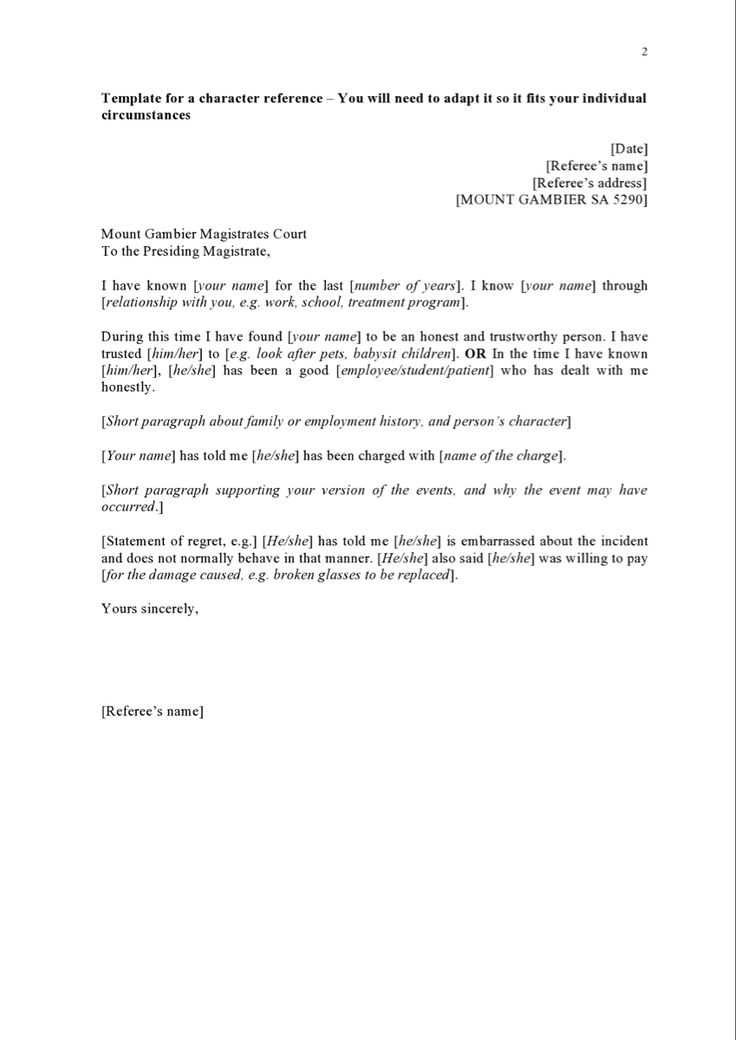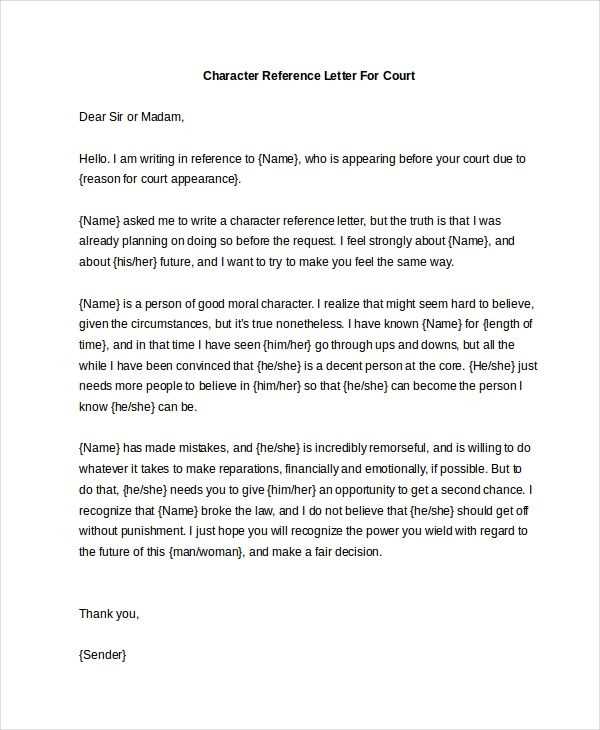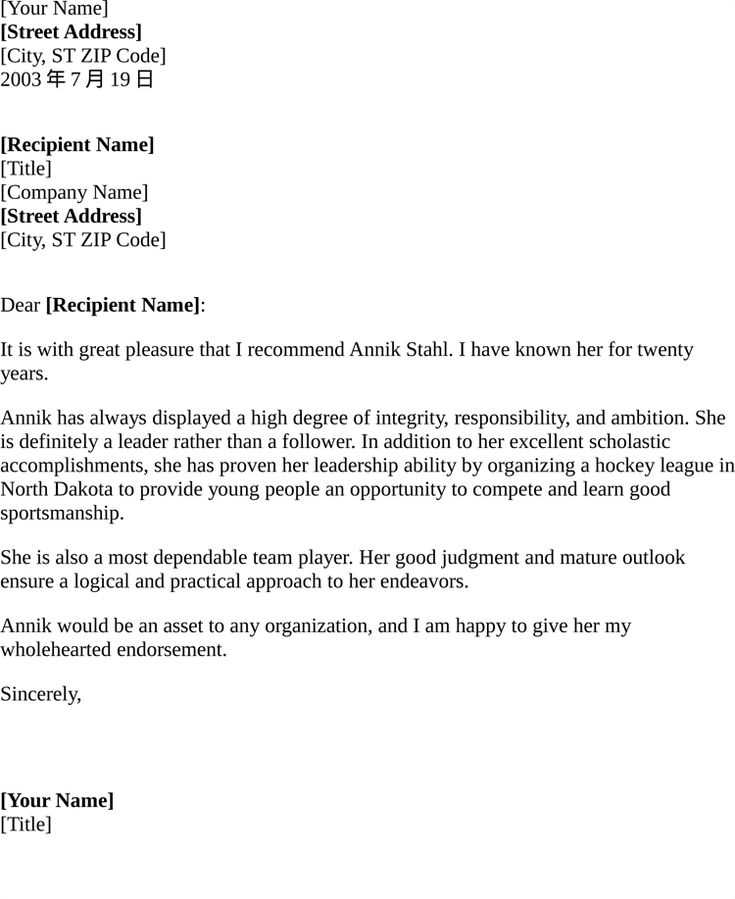Character Reference Letter Template for Court

When involved in a legal proceeding, providing a personal statement of support can be a valuable tool. Such documents offer insight into the character and integrity of an individual, often playing a key role in influencing decisions made by the court. These testimonials are written by those who know the person involved, describing their positive traits and behavior.
Crafting an effective statement requires careful thought and structure. It is essential to highlight relevant qualities that reflect the person’s values, actions, and contributions to the community. The information presented should be both specific and genuine to ensure it resonates with the recipient and serves its intended purpose.
Whether you are writing on behalf of a friend, colleague, or family member, your words can have a meaningful impact. The approach taken should be respectful, focused, and free from exaggeration. By offering a truthful portrayal, you contribute to providing a clear picture of the person in question, which can be influential in the decision-making process.
Understanding the Purpose of a Character Reference

In legal situations, personal testimonials serve as a powerful way to offer insight into an individual’s behavior, character, and moral standing. These statements are typically provided by those who know the person involved, presenting a more personal and human side of the individual. Rather than focusing on the legal aspects of the case, these documents aim to highlight qualities like integrity, trustworthiness, and respect for others.
Why These Testimonials Matter
These written accounts can have a significant impact on a legal decision, especially when they offer a perspective that the court might not otherwise have. By showing the individual’s positive contributions to their community or demonstrating their capacity for change, such statements can influence outcomes in a variety of cases. The purpose is to give the decision-makers a more complete view of the person involved, beyond the immediate charges or circumstances.
Strengthening Your Case

A well-written testimonial can make a substantial difference by supporting claims made by the defendant or their legal team. This support might be used to request leniency, demonstrate good character, or emphasize the individual’s positive qualities. It is crucial that these statements are sincere and based on genuine experiences, as authenticity plays a key role in their effectiveness.
Key Elements of an Effective Letter
Writing a supportive statement requires attention to detail and structure to ensure it serves its purpose. The content should be clear, specific, and focused on demonstrating the individual’s strengths and positive attributes. Proper formatting and a respectful tone are essential for maximizing the impact of the message.
Introduction and Context
The opening of the document should establish the relationship between the writer and the person in question. It is important to mention how long you have known the individual and in what capacity. This helps the recipient understand the basis of your opinion and lends credibility to the content that follows.
Specific Examples and Qualities

Effective documents often include real-life examples that illustrate the person’s positive attributes. Focusing on actions or behaviors that reflect integrity, responsibility, or kindness helps create a more compelling case. Mentioning specific occasions where the individual demonstrated these traits adds weight to the statement and makes it more convincing.
How to Structure Your Reference Letter
The organization of your supportive statement is crucial to its effectiveness. A clear and logical flow ensures that the reader can easily follow your points and understand the message you’re conveying. By organizing the content into distinct sections, you help the recipient focus on the key points that matter most.
Opening and Personal Connection
Start by introducing yourself and explaining how you know the individual involved. Mention the duration and nature of your relationship, whether personal or professional. This sets the context and helps establish your credibility as a reliable source of information.
Body and Supporting Evidence
In the main section, focus on specific qualities and actions that demonstrate the individual’s positive traits. Use concrete examples to support your claims, showcasing moments where the person has shown integrity, responsibility, or kindness. These real-life instances help to substantiate your statements and add weight to the overall message.
Common Mistakes to Avoid in Letters
When writing a personal testimonial, it is important to avoid common pitfalls that can undermine the credibility or impact of your message. Small errors in tone, structure, or content can reduce the effectiveness of the statement and fail to convey the intended support. Being mindful of these mistakes helps ensure the message remains clear and persuasive.
Over-Exaggeration
Avoid making exaggerated claims or overstating the person’s qualities. While it is important to highlight positive attributes, making unrealistic or grandiose statements can diminish the authenticity of the message. Stick to genuine examples and ensure that your description is both accurate and truthful.
Lack of Specificity
Generalities are often ineffective when trying to make a strong case. Instead of vague statements like “He is a good person,” focus on specific actions or traits that demonstrate why the individual is trustworthy or reliable. Providing concrete examples will make your message more compelling and credible.
Why Judges Value Personal Testimonials
Judges often look for more than just the facts of a case; they seek a deeper understanding of the individual involved. Personal testimonies provide insight into a person’s character and can help paint a fuller picture of their actions and intentions. These statements are particularly important in situations where a person’s past behavior or personal qualities can influence the outcome.
Understanding the Impact
Personal testimonials help the judge assess the true nature of the individual, especially in cases involving sentencing, rehabilitation, or character assessment. Judges value these accounts because they offer context that legal documents and arguments cannot provide. A well-crafted statement can give the judge a sense of the individual’s remorse, growth, or potential for change.
Key Reasons Judges Value These Statements

- Insight into personal growth: Demonstrates whether the individual has made positive changes over time.
- Contextual information: Provides a broader perspective on the person’s life and relationships, which can influence decisions.
- Humanizing the case: Offers a view of the person as more than just a defendant or accused.
- Support for rehabilitation: Shows the individual’s commitment to improving their life and contributing positively to society.
Tips for Writing a Strong Testimonial

Crafting a compelling and effective personal statement requires more than just stating facts. The key is to convey sincerity, provide concrete examples, and stay focused on the qualities that truly make the individual deserving of support. A well-structured and honest testimonial can have a significant impact, influencing decisions and demonstrating the individual’s positive traits.
Focus on Key Attributes
Highlight specific characteristics and actions that showcase the person’s integrity, responsibility, or growth. Personal examples that demonstrate these traits in action will strengthen your message and make your statement more persuasive.
Formatting for Clarity
Organization is crucial for a clear and impactful message. A structured approach helps ensure the reader can easily follow the points you are making. Below is a simple table that outlines the essential elements to include when crafting your testimonial:
| Section | Description |
|---|---|
| Introduction | State your relationship to the individual and how long you have known them. |
| Main Body | Provide specific examples of the person’s positive traits or actions. |
| Conclusion | Summarize the individual’s character and express your support or endorsement. |